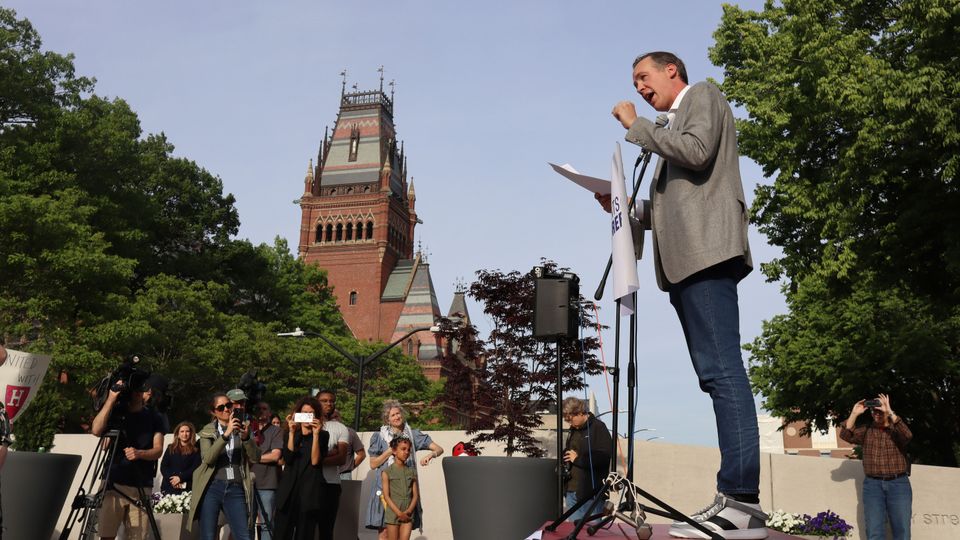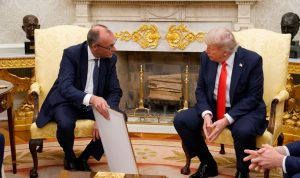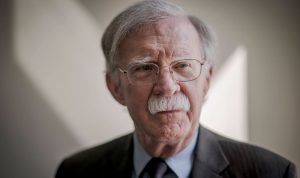Ryan Enos at a protest at Harvard University.
DER SPIEGEL:Professor Enos, when JD Vance, then a local politician, gave a speech in 2021 entitled "Universities Are the Enemy," hardly anyone took him seriously. Now Vance is Donald Trump's vice president, and his administration is trying to bring elite U.S. universities into line. Harvard has been a particular focus. Is your university now the Trump administration's greatest enemy?
Enos:When Vance said that back then, it seemed like mere rhetoric. In the past, populist Republican politicians have sometimes claimed that universities are elitist places supposedly directed against the people. But this is different. Donald Trump and his administration are using their power to attack and openly harm Harvard and other universities with the goal of subjugating these institutions to his will. Yes, Trump is truly treating Harvard like an enemy.
Ryan Enos, 47,is a professor of political science and the director of the Center for American Political Studies at Harvard University. The focus of his research is political attitudes and voting behavior. Together with his colleague Steven Levitsky, he published an open letter in the university newspaper Harvard Crimson calling on university leadership to defend Harvard against the attacks from the Trump administration. Enos has two daughters whose finger paintings decorate his office window.
DER SPIEGEL:Is this what you were expecting after his election victory last November?
Enos:I didn't anticipate this extreme approach. Trump has been acting in an unrestrained, authoritarian manner for months, attacking the media, courts, law firms and government agencies. His attacks on universities have been the most targeted and brutal, especially Harvard.
DER SPIEGEL:Why has Harvard become the main target?
Enos:I think there are three reasons. First, Trump is following the classic pattern of authoritarian leaders who want to destroy democracies. He is attacking the institutions of civil society that could potentially limit his power: judges, broadcasters – or, indeed, universities, as places of free thought. Second, Trump thought it would be popular to attack elite universities because parts of his electorate were critical of them. He miscalculated, but more on that later.
Enos:Donald Trump now harbors a personal grudge against our university because it openly opposes him. Harvard is the beacon of resistance against Trump. No other institution in the U.S. opposes him so openly. Trump wants to break this resistance.
DER SPIEGEL:Until now, the venerable Harvard University was not known as a revolutionary mecca. How did you, of all places, become the beacon of resistance?
Enos:When the Trump administration began attacking universities in early March after its attacks on the media and the judiciary …
DER SPIEGEL:… first Columbia University in New York, which quickly submitted …
Enos:… many academics here thought that Harvard, as the most prominent university in the U.S., would also be targeted. And that this would pose a significant threat to our democracy if we also submitted. My colleague Steven Levitsky and I subsequently called on the administration and the supervisory board of our university in various media outlets to fulfill our duty as role models and fight for democracy and the freedom of universities. Along with other efforts, this helped mobilize and unite many alumni, students, and especially academic staff.
Enos:We jointly wrote a letter to the Harvard leadership, led by President Alan Garber, in which we called on them to oppose the attacks, together with other universities. More than 800 Harvard professors and lecturers signed this letter. As far as I know, this was the largest number of faculty members ever to sign a comparable letter in Harvard's history. But the letter was certainly not the sole reason why Harvard's leadership made this decision. There was a whole series of petitions, both from students and alumni. And the Trump administration's demands, such as taking control of admissions and the hiring of faculty and the organization of academic departments, were simply unacceptable.
DER SPIEGEL:Last week, thousands of graduates applauded Garber for his course and celebrated lavish graduation parties. Shortly thereafter, the Trump administration announced that it would temporarily halt the issuing of visas to foreign students and later rigorously review them. What does that mean for Harvard?
Protest at Harvard: "Trump's attacks on universities are unpopular."
Enos:The number of international students will fall – even if, as I expect, we win our lawsuit against the administration's ban on foreign students in court. Some of our international students will leave Harvard simply out of insecurity – perhaps because they fear being arrested on the street …
DER SPIEGEL:… like Turkish student Rumeysa Öztürk from Tufts University, who was only released from weeks of deportation detention in Louisiana after a court ruling.
Enos:Even new applicants who already have visas will hesitate to come to us. And others who don't yet have entry permits may not get one so quickly. The Trump administration can make life difficult for international Harvard students.
DER SPIEGEL:Would you advise a high school graduate from Germany to study at Harvard right now?
Enos:Yes, I would advise them to apply to Harvard (smiles) … but that's also a bit selfish, because I have fantastic students from Germany. And we would suffer if these talented people from all over the world stopped coming. Harvard isn't Harvard without its international students. But I would also make it clear to these high school graduates: The situation here is more uncertain than ever before, and I can't rule out that the Trump administration will do something that will disrupt their lives. We have to be honest about that.
DER SPIEGEL:What about students who have already started at Harvard and are now worried that the government will revoke their visas?
Enos:These people trusted the United States: its culture, its institutions, its laws, its rule of law. Now much of that is turning out to be questionable. If the government now abandons these people who trusted us, it will be a disgrace for our entire society. And it will have consequences. I fear that many of the world's brightest minds will go elsewhere: to Great Britain, to Germany, and some even to unfree societies like China.
DER SPIEGEL:What about the other U.S. universities? Are they supporting Harvard in its fight against Trump?
Enos:We're experiencing a lot of solidarity. Hundreds of university administrators are openly siding with us. That's really important. But other universities can't help us financially. The federal government has stopped all federal government funding.
DER SPIEGEL:We're talking about up to $3 billion that Harvard will be missing in the future. Though you have a $53 billion endowment, most of it is tied up in around 14,000 funds and can only be used for specific purposes. Will the university soon run out of money?
Enos:No, we can hold out for quite a while. The university has reserves that it can tap into in an emergency. And recently, we've received many new donations from wealthy alumni; our institution is currently experiencing a wave of sympathy. According to polls, Trump's attacks on universities are unpopular, and even his own supporters aren't enthusiastic. Recently, an avowed Republican even told me that he had given us money. He wants Harvard to win this fight.
DER SPIEGEL:What if Harvard's leadership ultimately does end up surrendering to Trump?
Enos:America cannot afford for Harvard to fall. I consider it vital that this university maintains its resistance: for itself, for the higher education sector, and for our entire society. It's about our democracy. That's why it's now especially important that other universities, social groups and institutions show more resistance to Trump.










